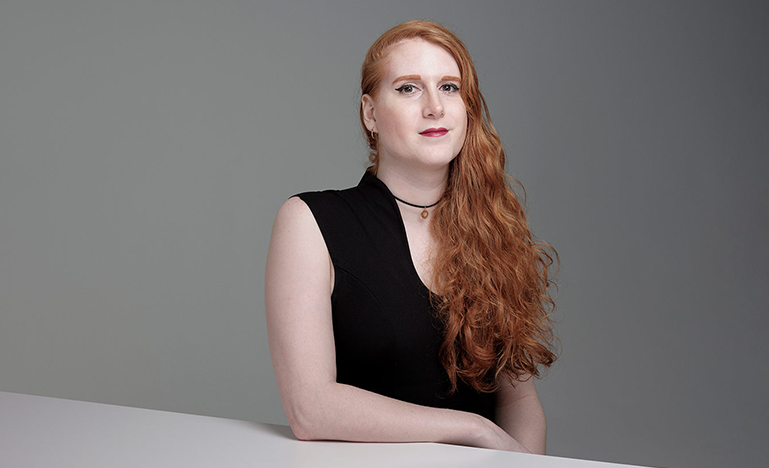En-“gendering” change
Florence Ashley, humanist and activist for the rights of transgender and non-binary people.

Since 1999, the Canadian Bar Association has given out the Sexual Orientation and Gender Identity Community Section – Hero Award to recognize excellence from members of the LGBT2S community who have advanced the cause of equality through their actions or career contributions or by serving as a role model for other members of the communities. The less widely known “2S” in the acronym refers to two-spirit individuals, indigenous people with a fluid conception of their gender.
This year’s recipient is Florence Ashley. They* are a “a non-binary transfeminine activist” who has published articles in respected academic journals and spoken out on behalf of transgender and non-binary people who find it difficult to navigate a society still committed to traditional notions of masculinity and femininity.
“Not every problem can be solved by banning discrimination.”
“Let’s just say there are a lot of areas that need improvement,” says the 26-year-old activist in a phone interview. They give the examples of employment and housing access, where discrimination still goes unpunished, because “in an unequal system, members of marginalized groups are too poor to avail themselves of the judicial system.” At the same time, they bring up the “excessively high cost of transitioning and the lack of coverage for mental health,” which are serious problems, as trans people disproportionately suffer from depression and anxiety, often due to being misgendered.
In terms of economic mobility and equality, Quebec law stipulates that transgender migrants must have citizenship before they can change the name and designation of sex on their birth certificate. That can take up to seven years – time during which a person’s official documents don’t match their public identity, causing problems with customs officers, employers, landlords, the list goes on. “Why is this even on our birth certificates?” asks Florence, referring to the designation of sex. These two mandatory and mutually exclusive boxes, M and F, marginalize non-binary people because they “normalize the idea that this is all gender is.” There is a lawsuit underway to force the Government of Quebec to include “Other” or “X” on its forms under the designation of gender or sex section, like Passport Canada did in 2017.
One of Florence’s most noteworthy contribution to education is a paper on non-binary students and language. In it, they enumerate the specific obstacles non-binary people face in the educational system, and make the case that guaranteeing real integration requires more than “not discriminating.” They argue that what’s needed are strong policies that spell out “how they should be implemented,” coupled with “inclusive education, ideally integrated as part of the curriculum.”
From activism to academia
In their Masters of Laws at McGill University, Florence Ashley took an interest in laws prohibiting “conversion therapy” (also known as “reparative therapy”) for trans people, how they differed and what their impacts were. Conversion therapy is currently experiencing a resurgence in medicine, especially for children. According to Florence, this is a “mass phenomenon” whose causes are difficult to discern. However, an increasingly conservative political climate and social media have helped to create “more and more interest and support for people who five years ago were fading somewhat from the public sphere.” The debate is heated, and there is an ever-present risk of public outrage. For example, “the passage of Bill 77 in Ontario created a bit of a backlash” (the bill cut public funding for conversion therapy treatments for adults and prohibited it for children).
In addition to finishing their thesis and publishing future journal articles, Florence will be putting their many talents to use next year as a clerk for Supreme Court Justice Sheilah L. Martin. They will be the first openly trans person to serve in this important role, doing research to support the legal decisions that shape national law. And after that, who knows? A PhD, probably!
Quick guide to being an effective ally
According to Florence, a prolific author, everyone can contribute to a more just society for trans people. You can start by speaking up “if someone makes transphobic comments around the table, at Christmas, in class.” However, they say it’s especially “necessary to amplify the voices of trans people, to create space for trans people and not take that space.” In this era of cross-platform communication, “trans people’s words can be shared” and they can be “given visibility when choosing who to invite to a conference.” To this end, event organizers need to realize that “trans people are not interchangeable” and “their fields of expertise should be respected.”
Also, dialogue should be fostered with people who have different experiences than us, even if this means sometimes messing up, saying the wrong thing and being criticized for it. “We are in a society that puts too much emphasis on results.” However, being honest is what matters most, they say. “The thing that makes me decide I don’t like you isn’t saying or doing something problematic, it’s becoming defensive when I mention it,” says the fervent humanist. All someone needs to do if they want to be an ally is remain intellectually honest and make an effort to do better. “Several times, I’ve gone from seeing someone as “meh” to “better in my books” after noticing the emotional work and self-criticism they did after saying something.” Discussing the added value of an attitude like this in fields such as health law that are closely linked to personal experience, Florence wisely observes that “it might be why I like to surround myself with people who are sensitive to this facet of the human experience.”
* The singular they is an increasingly common gender-neutral pronoun, used both by non-binary people and as a way to write about unknown persons without relying on the gender binary implicit in terms like he/she.


